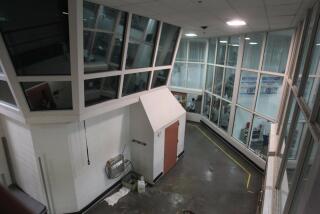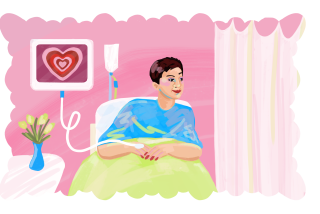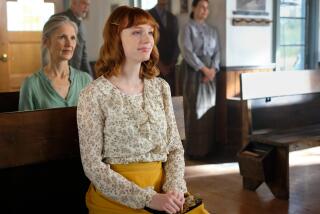Ailing Woman Rescued 9 Days After Falling
- Share via
For nine days, 64-year-old Amparo Prado lay wedged between her bed and a wall, unable to lift herself. No one heard her screams. No one heard her cries for food and water.
No one knew this wheelchair-dependent diabetic was alone. No one, except her husband, Agustin.
But for eight days he lay in a hospital bed, intubated, unconscious and unaware that his wife of 39 years was in trouble.
On the ninth day, Agustin woke up. And he called out her name.
Very early Tuesday, Los Angeles Police Sgt. Greg Staats pried open the door to their modest Highland Park bungalow and shone a light into her eyes. Amparo Prado blinked and smiled.
On Feb. 16, with Amparo in the passenger seat, Agustin had driven himself to the Kaiser facility on Sunset Boulevard. He was vomiting and doubled over in pain.
Emergency room doctors quickly diagnosed his uncommon and life-threatening condition and rushed him into surgery.
Before he was wheeled in, he told Amparo to take a taxi home and promised to return home by last Wednesday to drive her to her next dialysis treatment.
After Agustin’s surgery, the Kaiser staff helped Amparo into a cab. Agustin was hooked up to a ventilator, unable to talk, heavily sedated and unconscious most of the time, hospital officials said.
He began to ask for his wife late this Sunday, but was still disoriented, slipping in and out of consciousness.
According to police, Amparo, who has difficulty walking and uses a wheelchair much of the time, fell soon after arriving home Feb. 16.
Hungry and thirsty, she yelled over and over again for help. “She’s got the sweetest little voice and I’m sure no one could have heard her,” said Connie Matthews, a spokeswoman for Huntington Memorial Hospital in Pasadena, where Amparo was taken by paramedics on Tuesday.
Complete darkness enveloped her at night. During the day, light filtered through closed mini-blinds and drawn curtains. Their home is a beaten-up square clapboard bungalow that couldn’t be more than 1,000 square feet.
Before long, the staff at Kaiser’s dialysis center noticed that Amparo had missed three appointments. But the Prados are an intensely private and insulated couple, and she had missed sessions before.
Although she had permission to go to another clinic, the center’s staff began to wonder what had happened to Amparo.
A Kaiser spokeswoman said their social service workers had noticed the couple’s reclusive nature and Amparo’s health problems and had asked Los Angeles County social workers to conduct a home visit. But no one had answered the door during three visits beginning in January.
The workers couldn’t call either. The Prados don’t have a phone.
“We had one for a while,” Agustin said from his hospital bed Tuesday. “But my wife said, ‘No phones, I don’t want to be answering phones.’”
Their emergency contacts are each other. Agustin had recently retired as a roofer to care for Amparo full time. He made her Cream of Wheat for breakfast and her favorite picadillo “or whatever else she wanted” for supper. He bathed her and took her to doctor appointments.
“Every day we would argue like cats and dogs with each other,” he joked. “But it would only last 15 minutes.”
Agustin said that they were content to rely on each other and fearful to seek government help because they are undocumented immigrants.
Their neighbors, in all the years they have lived on North Avenue 63, could recall waving to the Prados only a few times. They never spoke.
“I feel so bad, we have lived here for years, but never talked, said Cristina Membrano, 51, whose backyard is across from the Prados’ kitchen, with a tall, cinder-block wall between them.
When Agustin could finally explain that Amparo was alone, the hospital staff contacted police.
At 10:30 p.m. Monday, Officer Gabriel Rivas arrived at the darkened, sealed house. He called his supervisor and Sgt. Staat arrived with paramedics.
In the kitchen, they saw a bird cage. The bird inside lay dead. A makeshift altar on the table included a rosary and statue of the Virgin of Guadalupe.
The stench in the house was the smell of death, Staats recalled, and he braced himself for the worst as he worked his way through the tiny, pitch-dark rooms.
“In between the bed and the wall I saw a face,” Staats said. She looked at me, blinked her eyes and then she smiled.... She had a weak smile, but it was an obvious smile.”
Her first words were to ask about her husband.
The couple lived a nightmare that many older people dread, said Donna Benton, director of the Los Angeles Caregiver Resource Center.
“That’s a fear for any older adult or couple trying to live on their own,” Benton said. “What happens if I call and no one is at home? What happens if I become sick?”
Amparo and Agustin are to be reunited at Kaiser Permanente’s Los Angeles Medical Center as early as today.
Amparo is dehydrated and disoriented and was undergoing dialysis Tuesday at Kaiser’s West Los Angeles hospital, a spokeswoman said. She is expected to recover.
Doctors who examined her said that in some ways it was fortunate that she did not have food during the ordeal.
Without dialysis and medication, her body would have been unable to rid itself of toxins.
“It’s kind of a mystery how she survived so long. A person can survive two to three days without fluids. They can go a long time without eating, but they have to drink,” said Dr. Fred Alexander, medical director for Kaiser’s West Los Angeles Medical Center.
Agustin remained hospitalized after surgery that repaired a severe rupture of his esophagus.
But now they will be together again--albeit in sickness--this older couple without children, without friends or neighbors to check on them, without a phone.
“My heart was scrunched without her,” Agustin said from his intensive care bed, an oxygen tube taped to his nostrils. “We are always together, we are never apart.”
The moment he sees her, Agustin said, he will tell his Amparo, “I love you so much. Please forgive me. I will never leave you again.”
*
Times staff writers Hector Becerra and Jocelyn Y. Stewart contributed to this report.
More to Read
Sign up for Essential California
The most important California stories and recommendations in your inbox every morning.
You may occasionally receive promotional content from the Los Angeles Times.













